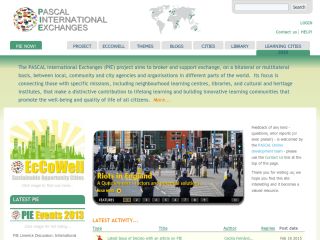Workshop - Incentives and Infrastructure for Knowledge Mobilization
Ottawa, Canada
Knowledge Mobilization
Making what we know ready for service and action is a complex process. We often have an overwhelming quantity of data and information with little meaning. Creating coherence and understanding is exciting, rewarding, and motivating. It is also one of the most important things we can do in our knowledge-based society.
It is because of this complexity that strong and productive relationships are required to share ideas, goals, resources, and rewards – no single person, organization, or sector can do this alone. We are truly interdependent in this knowledge intensive age.
This is an invitation to participate, as a pioneer in Knowledge Mobilization practice, in the first of a series of ten workshops called "Knowledge Mobilization Boot Camps" across Canada for 2009.
What is a Boot Camp Workshop?
A "boot camp" is an intensive, interactive workshop where the knowledge, skills, experience, and intelligence of every participant is drawn together to produce a collective understanding product? Studies have shown that passive events where individuals just "consume" more data and information do not lead to the types of attitudes, norms, and behaviors necessary to support action from learning events. We want to help people get whipped into shape and be able to return to their workplaces, ready to run, surrounded by an international community of people who have shared in this intensive learning?
Boot Camp #1 focuses on two problems: creating incentives for engaging in knowledge mobilization and building infrastructure that supports these activities. Incentives without infrastructure will lead to frustrated individuals and wasted efforts. Infrastructure without incentives for behavior will remain unused and hollow.
We will explore three topics:
- What incentives for knowledge mobilization are working now and why?
- What role does infrastructure (public and private) play in successful knowledge mobilization ?
- What are effective methods for creating a knowledge mobilization culture?
We will produce three items:
- A synthesis of experience from participants.
- A set of recommendations to the Federal Granting Agencies and Key Federal and Provincial Government Departments.
- An agenda of further work to share with the KMb community.
Who should attend?
Participants will be practitioners, academics, policymakers from health, education, business, and affiliated sectors and agencies interested in improving the uptake and use of knowledge in their professional environments. They will have some experience with knowledge mobilization (management, transfer, exchange, dissemination, diffusion) and are interested in focused, intensive activity that builds a community of practice as well as moves an agenda forward that builds value from effective and efficient knowledge mobilization strategies.
What will participants gain?
Access to leading thinkers and practitioners across societies' most influential sectors. A reflection of their own capacity and an opportunity to focus on areas of professional practice needing further development. An opportunity to influence local, regional, and national policy on effective use and access to knowledge. Great conversation and an opportunity to test skills with colleagues and potential partners.
About the Boot Camp Series:
We have three goals:
- Bring people together that have an interest in knowledge mobilization to build relationships and shared commitment.
- Engage in purposeful activities that are grounded in the contexts and capacities of work, community, and productive social interaction.
- Develop recommendations and an emergent agenda for building the supports, institutional adaptations, and cultural changes needed to move from what we know to what we do.
During each "Boot Camp", up to 100 participants will engage around a theme – such as leadership, human resources, education, health, governance, security – and work at imagining the elements of systems that will enable the creation of the greatest value from the use of what we collectively know.
For more information you may visit: http://www.regonline.ca/builder/site/Default.aspx?eventid=674577
 Printer-friendly version
Printer-friendly version- Login to post comments
- 276 reads
- Calendar






